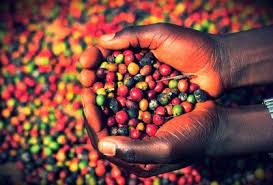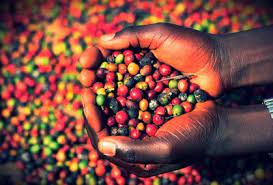Factors Affecting Coffee Production in Uganda

What are the Factors Affecting Coffee Production in Uganda?
There are many different factors affecting coffee production in Uganda.The reason this issue has become so serious and problematic is because the country and it’s economy has become reliant on it’s regular exportation of coffee.
Uganda has the ideal climate for coffee production, which is their top export. As a result it has been able to maintain its position as the 9th biggest coffee exporter in the world. If something impacts Uganda’s production of coffee, it can have devastating effects that ripple out across the entire country.

Climate Change
A country's climate is a combination of a location's weather, temperature and humidity. Each region of the earth has its own specific climatic conditions.
Since the industrial era, as early as 1760, we have been pumping fossil fuels into the atmosphere causing heat rays from the sun to become trapped and this is called 'the greenhouse effect'.
This is causing our atmosphere to heat up at an accelerating rate which is in turn melting the ice caps and causing the sea water to expand which consequently is causing our sea levels to rise by at an increasing 3mm per year.
Due to this substantial change in our atmosphere our weather patterns are changing and natural disasters are happening far more frequently.
The main factor that affects coffee production in Uganda is rainfall and droughts which varies from year to year. In general, there is an increase in rainfall during the months of April through June which results in increased yields for most varieties of coffee beans. However, if rains fail or are too light then farmers will have less yield than expected.
And now as global warming and climate change continue to accelerate each and every year, the previously roughly predictable weather patterns that farmers rely heavily on are now becoming more and more unpredictable and the chance of both flooding rains and draughts are far more likely, making it increasingly difficult to keep the coffee bean yield up to scratch.
Population Growth, Industrialisation and Urbanisation
The earth's population has quite literally tripled in just the last 70 years. Therefore our infrastructures of housing, agriculture, roads etc. Has likely more than tripled alongside it.
Because of this many areas that used to be home to coffee bean trees and coffee farms are now home to factories, warehouses and housing estates.
This pure lack of physical space has caused an evidential decrease in the coffee production of Uganda.
In the 20 years before 2010, Uganda's population grew from 5,158,000 to 33,797,000. This means the population growth rate is 3.2%, that's about 1 million per year! Uganda’s population is expected to quadruple by 2045 if the birth rate stays at 6.7 children per woman.
For Uganda this means far less agricultural space and is expected to largely affect the coffee industry.

Lack and Cost of Labor
Since the beginning of the 20th century many people with agricultural skills migrated to Uganda in search of work, both from outside and within the country. Those with cultivation skills found their way to the 10 coffee districts and many with livestock herding skills migrated to the parts of Uganda dominated by cattle farming.
This influx of manual labor supported Uganda's farming businesses and kept the cost of labor low due to the lack of labor demand.
The further back in time you go the more children you will find in the workplace. This is due to family's either not being able to afford their education or not being able to afford the loss of income that would come with their child not working but as the years go on more and more families can afford to send their children to school.
Many children still both work and go to school although their working hours are limited to holidays which are mainly off season for the coffee bean production industry.
Due to more and more children receiving education as the years go on there are simply many more people going into professions like banking, law, medicine, engineering etc. These fields pay much better than manual labor.
Available labor has reduced greatly over the last 15 years because in Burundi and Rwanda, where the majority of migrants from outside Uganda were coming from, there is now peace.
Nowadays the areas both inside and outside of Uganda, where migrants originally came from, are now seeing an increasing amount of better opportunities locally to them. This and the lack of a need to run from conflict has raised the costs and reduced the amount of available labor considerably.
The Temptation of Alternative Crops
Lots of land once used for coffee bean production has been lost to farming enterprises that dupe coffee bean farmers into switching to an alternative crop usually due to promoters perpetuating that this alternative crop will be far more profitable.
When incorrect or misleading market information is heeded by farmers and they decide to migrate to a new crop, business failure is far more likely as supposed fast money crops like beans and maize rarely fare well and many crops suggested by promoters are due to a recent lack of supply in the market.
These will do well for usually a short amount of time, that is until the original suppliers bounce back to providing an efficient amount of the specific crop, this in turn causes the crop price to completely crash.
The likely risk of farmers migrating to alternative crops has greatly exacerbated the other factors mentioned in the article and the declining frequency of coffee farms has therefore caused a lack of people looking for or considering this line of work as an option.
Furthermore, there are certain permanent crops that support local ecosystems and help to protect the soil from toxicity. Uganda also has a particularly low use of synthetic chemicals which in turn coffee farms here cause very little environmental contamination.
By switching to these supposedly more profitable crops irreversible damage can be caused to the soil. Stagnation of the soil and land is inevitable and this very scenario has sadly caused environmental contamination and has affected environmental, social and economic benefits of the coffee bean production.
Depression of Prices
At the turn of the century there was a major fall in coffee prices, causing many farmers to ditch their coffee fields and find alternative careers.
On top of this, around the same time that the prices dropped, Uganda was hit with a nasty bout of Coffee Wilt Disease (CWD), wiping out large amounts of coffee trees.
Due to the value of the coffee bean going down so substantially the farmers didn't deem it worthy to treat the Coffee Wilt Disease and therefore there was a significant decline of coffee produced in Uganda.
Unfortunately there is no fail safe way to prevent the damage caused from sudden product price drops. Because of this farmers had no choice but to either sell their farms and find work elsewhere or to plant a new type of crop that they hope will bring in a far better yield.
Because of the 5 year low price period at the beginning of this century a large amount of resources and land migrated from the coffee industry to other businesses and when the end of the low coffee prices came about in 2005 unfortunately only a small percentage was reclaimed into the coffee bean industry.
Lack of Today's Youth in the Industry
Unlike 50 years ago, today's youth have got many more options than their older relatives had back in their day when it comes to employment. The sustainability of Uganda's coffee production is under great threat due to this fact.
Due to the youth moving away from manual labor based work and into less physically challenging jobs, the general public opinion of Ugandan youths is that working in coffee fields is a very low tier job and they have effectively shunned it.
Instead they are particularly interested in blue and white collar jobs. Women have taken to jobs like shop keeping and hairdressing as they're deemed acceptable job roles for their gender and males engage in jobs like 'boda boda' taxi transport businesses and many many others are simply unemployed.
Also all these better opportunities that modern day times hold for Africa's youth has caused the amount of youths migrating in search of work to fall hugely and therefore greatly reduced the labor available to the coffee farms.
In a baseline survey performed by the UCDA, researchers found that only a very small percentage of coffee production workers are under the age of 30 while the majority is between 30 and 60 years of age.
Considering the fact that 75% of Uganda's population is under 30 years old these numbers are truly shocking and definitely mean bad news for Uganda's coffee businesses. Due to the lack of fit and healthy young people, production and yields have greatly slowed down.

Absence of Medium to Large Farms
The custom for farmers in Uganda for centuries has been to split their land between their children this in turn has created smaller and smaller farms and this is not good at all as the economic viability of the farmers is under threat.
Nowadays the average farm size in Uganda is 0.5 to 2.5 hectares which is nothing compared to 100 years ago.
A whopping 50%+ of Uganda's population are under just 15 years old with around 6-10 dependants in every household. So taking this into consideration, these increasingly small farms are very bad news for Ugandan families.
The Local Gender Role Dilemma
In Uganda's culture, like many other countries, men and women are sadly not seen as equals and this even applies to what crops they farm. Women have the social role of being the providers of food and so tend to farm crops like maize, vegetables and rice.
On the other hand the social role of a man is to provide money. Therefore crops like coffee, tea, tobacco, cotton, sugar, cocoa and rubber, which are known as cash crops, were grown predominantly by men.
Although nowadays women working in these sectors are much more accepted, and are in fact deeply involved in the industry, as men take on other roles deemed only for men like livestock farming and small businesses.
The issue is that although women work in these coffee farms they almost never get a say in the selling process or what the profits are spent on, even if let's say a husband and wife have a family owned coffee farm and they work this land together or even if the wife does the majority of the labor she will still not see the profits as this is not seen as a woman's role.
Subsequently this has reduced the amount of women going into the industry significantly, especially those who are married. Which is unsurprising because coffee is still seen as a man's crop regardless of the fact that women are heavily involved in the process as it is the men who profit from it.

Increasing Politicking and Decreasing Political Support
Due to many exportation industries becoming steady money providers for Uganda over the last decade, Uganda's age-old reliance on coffee exportation profits has decreased greatly. Although Uganda is still reliant on its coffee exportation earnings it is nowhere near as heavily as in previous years
The coffee trade has now got some major competitors for government support or perhaps it has simply gone off the local political area. This is mostly due to the significant growth of the following trades: Tobacco, tea and cut flowers.
Uganda's Coffee Development Authority (UCDA) have been trying for the last 5 years now, to apply for funds from the government to buy more coffee saplings and to also further fund needed coffee research. Unfortunately the government is not fond of these suggestions and no action has yet been taken.
Coffee tree nurseries have an excess of 12 million seedlings but there is simply nowhere for them to go as there are no funds for the UCDA to buy them and supply them to the struggling coffee farms.
The situation is greatly exasperated by politicians spreading false information in the form of reassurance that the UCDA will supply them with free trees and therefore they should not buy trees from the nursery's.
This interference and lack of support has derailed the production of coffee beans in Uganda and prevented upscaling.






